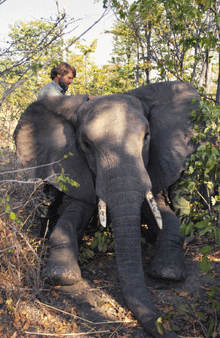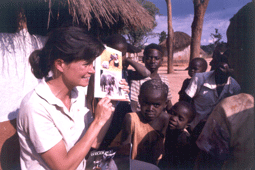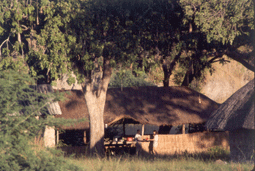Secrets of the Savanna
Air Date: Week of May 19, 2006

Mark Owens affixes a radio transmitting collar to an immobilized elephant in North Luangwa Zambia in order to track the movements of her family group to better understand the conservation needs of this population after 93% of their members were killed by poachers. (Photo courtesy of the authors)
When Mark and Delia Owens moved to the Northern Luangwa Valley in Zambia, ivory poachers were killing savanna elephants by the hundreds. And so they stayed to fight the destruction of Africa's wildlife, and helped stop poaching by helping villagers find alternatives in agriculture and education. Their new book is Secrets in the Savanna: Twenty-three years in the African Wilderness Unraveling the Mysteries of Elephants and People.
Transcript
CURWOOD: Mark and Delia Owens went to Africa as young graduate students in 1972. Their plan: to study its disappearing animals - the brown hyena, the lion. They didn’t know they would stay in Africa for the next 23 years. They didn’t know then how political zoology work could be.
But when they moved to the Northern Luangwa Valley in Zambia, ivory poachers were killing savanna elephants by the thousands. So they stayed to stop the slaughter by helping villagers find better alternatives in agriculture and education.
And they tell their story in their new book: “Secrets of the Savanna: Twenty-three years in the African Wilderness Unraveling the Mysteries of Elephants and People.” Mark and Delia, thanks so much for being here.

Mark Owens affixes a radio transmitting collar to an immobilized elephant in North Luangwa Zambia in order to track the movements of her family group to better understand the conservation needs of this population after 93% of their members were killed by poachers. (Photo courtesy of the authors)
DELIA OWENS: Thank you for having us.
CURWOOD: So here you are in Africa, Delia, to study lions. What’s the moment that you decide it’s all about elephants?
DELIA OWENS: We were putting mud up on our little mud and waddle hut. It was going to be our first house in Africa – it had a thatch roof and it was just some logs with mud on it – and gunfire broke out all around camp. In fact, the gunfire was so close Mark grabbed me and pulled me behind a tree. We thought people were shooting at us. And in fact they were killing elephants, and we found some dead elephants near our camp. And we decided at that very moment that we would postpone the lion study and try to stop the poaching of the elephants.
CURWOOD: Take us back in history though a little bit on this story. How did you stop that poaching, Mark?
MARK OWENS: Well the first thing we tried to do was motivate the local game scouts. There were only seven game scouts protecting an area one and a half times the size of Delaware. They were dressed in rags, they had no weapons, they hadn’t been paid in eight months. And so what we tried to do was motivate them with equipment. We thought at first that might just do it.
CURWOOD: It didn’t do it though.
MARK OWENS: Not even close. What we had to do in the end was supplant an entire illegitimate economy based on poaching with a legitimate economy where villagers were improving their agriculture, starting small businesses like fish farms, poultry units, little vegetable gardens and so forth, and also we gave them jobs. We were basically replacing the meat they were getting from poaching and the cash they were getting from poaching with all these little enterprises.
CURWOOD: Now this is amazing to me. You guys go in, you identify the poachers, and instead of trying to put them in jail you give them jobs?
MARK OWENS: Well yes. Because, I mean, poaching was profoundly decimating to the wildlife and also to the people who were enslaved to work for the poachers for a lump of meat. They paid a shooter, they’d hire a shooter and pay him $10 to kill an elephant. So it was a very degrading, corrupting influence on the village communities.
CURWOOD: Now your book is also about the importance of family, and how elephants are really challenged when their natal groups are taken apart. There was one in particular who really stands out in this book. Her name is Gift. What was so extraordinary about her?

Delia Owens shows a wildlife magazine to children in a remote village near North Luangwa, Zambia. (Photo courtesy of the authors)
Gift had a little jig that she would dance if we got too close to her. She would run towards us and flap her ears, and then she would stop and she would run in the opposite direction. It was a jig, it was so funny. But she was very, very special because she stayed around our camp for many years.
And then when she was eight and a half years old she had a calf, and she was the first one who showed us that the very young females were breeding. Because before poaching the elephants would not have their first calf until they were 16 years old. She was eight and a half and had an infant. We named the infant Georgia.
CURWOOD: So she would have gotten pregnant at six, because it takes two years to gestate an elephant.
MARK OWENS: Exactly.
DELIA OWENS: That’s right. The age of first ovulation in elephants had been cut in half. So this was the trick that the elephants had up their trunks to recover.
CURWOOD: You’re in a ridiculously dangerous place. At what point did the danger seem overwhelming?

Dr. Delia and Mark Owens conducted elephant research and conservation from the camp they built in the wilds of North Luangwa National Park in Zambia. (Photo courtesy of the authors)
And we really became, we got to know him. And I could do this little ritual dance. I would hold my arm up full stretch and reach out my fingers, and he would arch his trunk over and smell my fingertips, and we’d sort of turn around each other in sort of a ritual dance in camp.
Anyway, he was shot one day, by a very bad guy with a group of about 40 men who came to kill us and the elephants. At that point I decided we had to escalate the war against poachers, and I did that by shooting firecrackers at them.
CURWOOD: Shooting firecrackers at them?
DELIA OWENS: Yes. The firecrackers were harmless, but the poachers didn’t realize that. It scared them. They thought they were hand grenades or something.
CURWOOD: By the way, when you’re bombing these poachers with firecrackers they shoot back at you?
MARK OWENS: Very definitely. They were shooting AK-47s at me. When I was flying at night I could see tracers streaking past the wings at times. They came to camp, as I think I said, three different times – at least three – to assassinate us. Fortunately the village people, who were on our side by this stage, warned us in every case.
But what worried me the most was three poachers of the major poaching figures were trying to get a shoulder-fired missile from corrupt elements of the army to shoot me down. So that’s why I had to come up with something that made us look less like a soft target. But I didn’t just shoot the firecrackers. At the same time I started rumors that these were actually rocket-propelled grenades instead of firecrackers. It was a big bluff. (Laughs)
DELIA OWENS: And believe it or not, this was what really cleared the park out. Finally, after everything we tried, these firecrackers chased the poachers out of the park, and the poaching stopped dramatically. And that’s when it became dangerous, really dangerous for us, when we succeeded. When the poaching stopped the ivory dealers were put out of business, and some very high-level officials were making money off of ivory, so they then determined to stop us. And they tried a lot of different ways.
CURWOOD: Through all these difficult times, how do you keep a marriage together?
DELIA OWENS: (Laughs)
MARK OWENS: (Laughs)
DELIA OWENS: It was not easy. I thought that Mark was taking too many risks. I mean, we wanted to solve the problem, but it became so dangerous, and it was too much for me. And I actually moved out and built a smaller camp along the Luangwa River about, well, it was about 60 miles…
MARK OWENS: About 40 miles…
DELIA OWENS: About 40 miles from our camp. Forty miles, that’s a day’s trip in the bush. And I think that’s what helped, because it put some distance between us and I didn’t have to know when he was going out at night and everything. Actually, I think every woman should have her own camp. It was wonderful. Mark would come out for the weekends and we’d sit and watch the elephants or the hippos and we were able to find some peace again.
CURWOOD: Tell me, is it possible to save elephants without saving people?
MARK OWENS: No.
DELIA OWENS: No.
MARK OWENS: Absolutely not. If you think about human communities and wildlife communities juxtaposed throughout eons of time, they have always been interdependent. What we did in the North Luangwa was raise the standard of living not only for the wild animals but for the people, so that eventually when they reached a parity we could reassemble those ancient synergistic bonds between the two communities that had always existed.
DELIA OWENS: It ended so well. That’s what makes us happy, that after all this chaos and all these dangers, we never dreamed that it would actually end well.
MARK OWENS: Well what saved the project in the end, Steve, was that it was the local people really who saved the project. They simply would not let the corrupt elements of the government prevail. They were seeing so many benefits and had such an improved lifestyle and living standard that they basically, they and their chiefs, basically stood up and simply refused to accept that that project was finished. And it continues today. This is our 20th anniversary and it’s totally run by Zambians now. Northern Luangwa National Park is the most secure park in Zambia and probably in Africa.
CURWOOD: So I have to say guys, if I simply met you walking down the street or at the library or at a friend’s house over dinner, I’m not sure that I would see that you were so fearless and unstoppable as obviously you are. What’s your secret? What is it that drives you?
DELIA OWENS: We didn’t know what we were getting into when we went over there. We took it one day at a time, and when things got so dangerous we talked about quitting a lot, we really did. I’d say every other day we seriously asked ourselves why are we still here. And then an elephant would walk into camp, an elephant would stand five yards from us and look at us in the eye. And these people started depending on us, and their little children needed us, and we could see a little taste of success coming along. And we could not leave, we could not turn our backs on those people or the elephants who were depending on us.
CURWOOD: Mark and Delia Owens’ new book is called “Secrets of the Savanna.” Thanks so much for coming in today.
MARK OWENS: Thanks for having us, Steve.
DELIA OWENS: Thank you Steve.
MARK OWENS: It’s been a pleasure.
Links
Living on Earth wants to hear from you!
Living on Earth
62 Calef Highway, Suite 212
Lee, NH 03861
Telephone: 617-287-4121
E-mail: comments@loe.org
Newsletter [Click here]
Donate to Living on Earth!
Living on Earth is an independent media program and relies entirely on contributions from listeners and institutions supporting public service. Please donate now to preserve an independent environmental voice.
NewsletterLiving on Earth offers a weekly delivery of the show's rundown to your mailbox. Sign up for our newsletter today!
 Sailors For The Sea: Be the change you want to sea.
Sailors For The Sea: Be the change you want to sea.
 The Grantham Foundation for the Protection of the Environment: Committed to protecting and improving the health of the global environment.
The Grantham Foundation for the Protection of the Environment: Committed to protecting and improving the health of the global environment.
 Contribute to Living on Earth and receive, as our gift to you, an archival print of one of Mark Seth Lender's extraordinary wildlife photographs. Follow the link to see Mark's current collection of photographs.
Contribute to Living on Earth and receive, as our gift to you, an archival print of one of Mark Seth Lender's extraordinary wildlife photographs. Follow the link to see Mark's current collection of photographs.
 Buy a signed copy of Mark Seth Lender's book Smeagull the Seagull & support Living on Earth
Buy a signed copy of Mark Seth Lender's book Smeagull the Seagull & support Living on Earth

